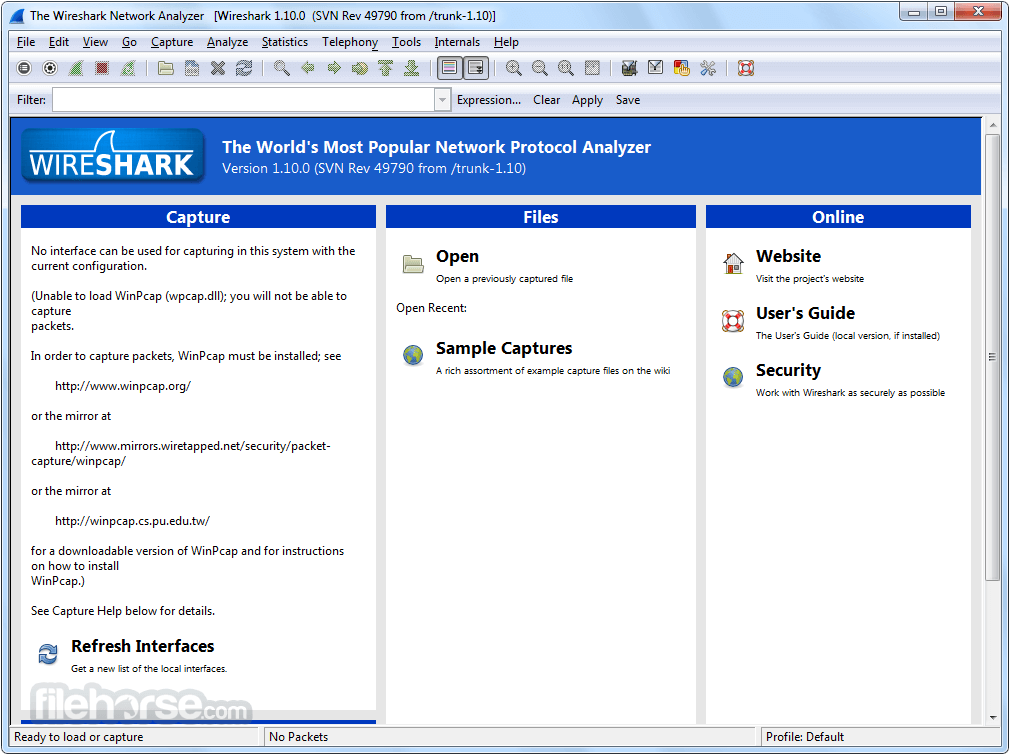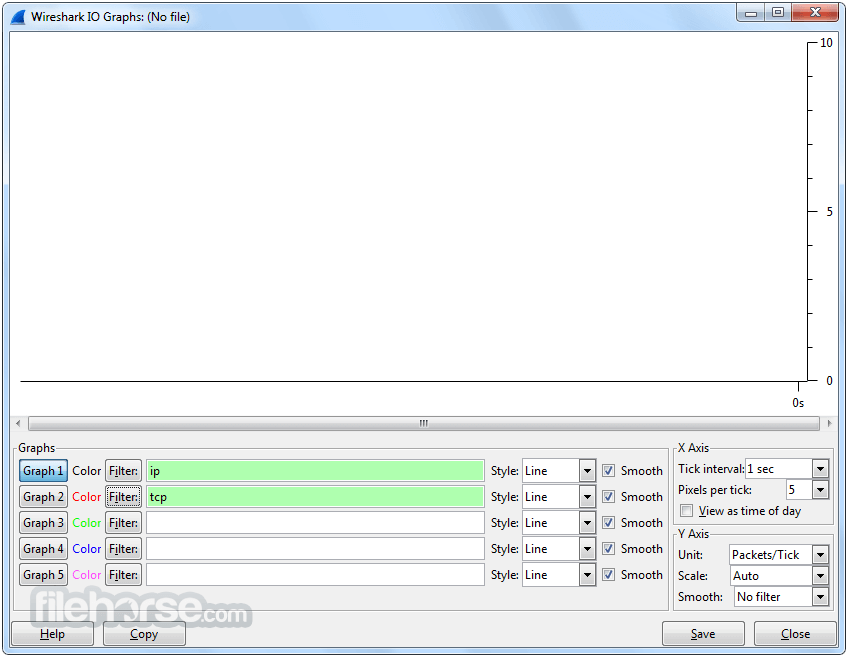-
Latest Version
-
Operating System
Windows XP / Vista / Windows 7 / Windows 8
-
User Rating
Click to vote -
Author / Product
-
Filename
Wireshark-win32-1.10.0.exe
-
MD5 Checksum
32c76e130a7c0746e738bd56f07da3ba
Sometimes latest versions of the software can cause issues when installed on older devices or devices running an older version of the operating system.
Software makers usually fix these issues but it can take them some time. What you can do in the meantime is to download and install an older version of Wireshark 1.10.0 (32-bit).
For those interested in downloading the most recent release of Wireshark (32-bit) or reading our review, simply click here.
All old versions distributed on our website are completely virus-free and available for download at no cost.
We would love to hear from you
If you have any questions or ideas that you want to share with us - head over to our Contact page and let us know. We value your feedback!
What's new in this version:
Bug Fixes:
- Redirecting the standard output didn’t redirect the output the of -D or -L flags. This fix means that the output of those flags now goes to the standard output, not the standard error, as it did in previous releases.
New and Updated Features:
- Wireshark on 32- and 64-bit Windows supports automatic updates.
- The packet bytes view is faster.
- You can now display a list of resolved host names in "hosts" format within Wireshark.
- The wireless toolbar has been updated.
- Wireshark on Linux does a better job of detecting interface addition and removal.
- It is now possible to compare two fields in a display filter (for example: udp.srcport != udp.dstport). The two fields must be of the same type for this to work.
- The Windows installers ship with WinPcap 4.1.3, which supports Windows 8.
- USB type and product name support has been improved.
- All Bluetooth profiles and protocols are now supported.
- Wireshark now calculates HTTP response times and presents the result in a new field in the HTTP response. Links from the request’s frame to the response’s frame and vice-versa are also added.
- The main welcome screen and status bar now display file sizes using strict SI prefixes instead of old-style binary prefixes.
- Capinfos now prints human-readable statistics with SI suffixes by default.
- It is now possible to open a referenced packet (such as the matched request or response packet) in a new window.
- Tshark can now display only the hex/ascii packet data without requiring that the packet summary and/or packet details are also displayed. If you want the old behavior, use -Px instead of just -x.
- Wireshark can be compiled using GTK+ 3.
- The Wireshark application icon, capture toolbar icons, and other icons have been updated.
- Tshark’s filtering and multi-pass analysis have been reworked for consistency and in order to support dependent frame calculations during reassembly. See the man page descriptions for -2, -R, and -Y.
- Tshark’s -G fields2 and -G fields3 options have been eliminated. The -G fields option now includes the 2 extra fields that -G fields3 previously provided, and the blurb information has been relegated to the last column since in many cases it is blank anyway.
- Wireshark dropped the left-handed settings from the preferences. This is still configurable via the GTK settings (add "gtk-scrolled-window-placement = top-right" in the config file, which might be called /.gtkrc-2.0 or /.config/gtk-3.0/settings.ini).
- Wireshark now ships with two global configuration files: Bluetooth, which contains coloring rules for Bluetooth and Classic, which contains the old-style coloring rules.
- The LOAD() metric in the IO-graph now shows the load in IO units instead of thousands of IO units.
New Protocol Support:
- Amateur Radio AX.25, Amateur Radio BPQ, Amateur Radio NET/ROM, America Online (AOL), AR Drone, Automatic Position Reporting System (APRS), AX.25 KISS, AX.25 no Layer 3, Bitcoin Protocol, Bluetooth Attribute Protocol, Bluetooth AVCTP Protocol, Bluetooth AVDTP Protocol, Bluetooth AVRCP Profile, Bluetooth BNEP Protocol, Bluetooth HCI USB Transport, Bluetooth HCRP Profile, Bluetooth HID Profile, Bluetooth MCAP Protocol, Bluetooth SAP Profile, Bluetooth SBC Codec, Bluetooth Security Manager Protocol, Cisco GED-125 Protocol, Clique Reliable Multicast Protocol (CliqueRM), D-Bus, Digital Transmission Content Protection over IP, DVB-S2 Baseband, FlexNet, Forwarding and Control Element Separation Protocol (ForCES), Foundry Discovery Protocol (FDP), Gearman Protocol, GEO-Mobile Radio (1) RACH, HoneyPot Feeds Protocol (HPFEEDS), LTE Positioning Protocol Extensions (LLPe), Media Resource Control Protocol Version 2 (MRCPv2), Media-Independent Handover (MIH), MIDI System Exclusive (SYSEX), Mojito DHT, MPLS-TP Fault-Management, MPLS-TP Lock-Instruct, NASDAQ’s OUCH 4.x, NASDAQ’s SoupBinTCP, OpenVPN Protocol, Pseudo-Wire OAM, RPKI-Router Protocol, SEL Fast Message, Simple Packet Relay Transport (SPRT), Skype, Smart Message Language (SML), SPNEGO Extended Negotiation Security Mechanism (NEGOEX), UHD/USRP, USB Audio, USB Video, v.150.1 State Signaling Event (SSE), VITA 49 Radio Transport, VNTAG, WebRTC Datachannel Protocol (RTCDC), and WiMAX OFDMA PHY SAP
Updated Protocol Support:
- Too many protocols have been updated to list here.
New and Updated Capture File Support:
- AIX iptrace, CAM Inspector, Catapult DCT2000, Citrix NetScaler, DBS Etherwatch (VMS), Endace ERF, HP-UX nettl, IBM iSeries, Ixia IxVeriWave, NA Sniffer (DOS), Netscreen, Network Instruments Observer, pcap, pcap-ng, Symbian OS btsnoop, TamoSoft CommView, and Tektronix K12xx
 OperaOpera 117.0 Build 5408.197 (64-bit)
OperaOpera 117.0 Build 5408.197 (64-bit) PC RepairPC Repair Tool 2025
PC RepairPC Repair Tool 2025 PhotoshopAdobe Photoshop CC 2025 26.5.0 (64-bit)
PhotoshopAdobe Photoshop CC 2025 26.5.0 (64-bit) OKXOKX - Buy Bitcoin or Ethereum
OKXOKX - Buy Bitcoin or Ethereum iTop VPNiTop VPN 6.3.0 - Fast, Safe & Secure
iTop VPNiTop VPN 6.3.0 - Fast, Safe & Secure Premiere ProAdobe Premiere Pro CC 2025 25.2
Premiere ProAdobe Premiere Pro CC 2025 25.2 BlueStacksBlueStacks 10.42.50.1004
BlueStacksBlueStacks 10.42.50.1004 Hero WarsHero Wars - Online Action Game
Hero WarsHero Wars - Online Action Game SemrushSemrush - Keyword Research Tool
SemrushSemrush - Keyword Research Tool LockWiperiMyFone LockWiper (Android) 5.7.2
LockWiperiMyFone LockWiper (Android) 5.7.2










Comments and User Reviews